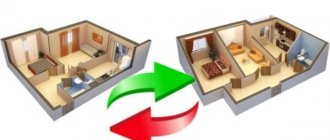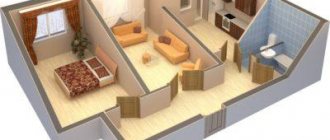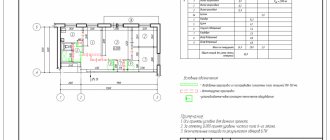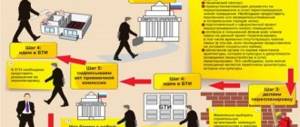Demolition and construction of non-load-bearing walls: in what cases approval is required
Do I need to approve the relocation of a doorway in a non-load-bearing wall? This option for changing the configuration of an apartment most often raises questions among owners. In their opinion, on the one hand, a doorway in a non-load-bearing wall is a redevelopment, but on the other hand, after such work nothing disappears and nothing new appears, since the opening only moves.
In fact, changes are still present: the area remains unchanged, but the plan will not remain the same. In the BTI technical plan, doors are indicated in certain places.
Relocating an opening in a non-load-bearing wall inevitably leads to a change in the graphic part of the technical plan. Therefore, approval in this case will be required.
But there is one nuance here. As a rule, such work is carried out by re-laying the entire wall.
Transfer of residential premises to non-residential premises
Most often, the transfer of residential premises to non-residential premises is carried out for its further use for commercial purposes. Since not all buildings can be transferred to non-residential stock, a completely logical question arises: “How to choose residential premises for transfer to non-residential property?” Such buildings have special requirements. The main ones are the following:
- the presence of a separate entrance that does not interfere with people’s access to other rooms of a particular building;
- accommodation on the ground floor. If it comes to an apartment, then it can be located higher, but provided that there are no residential buildings below it;
- the premises should not be used for human habitation;
- no encumbrance on property rights;
- the premises must not be a rental property.
The transfer of residential premises to non-residential premises is carried out quite quickly if specialists are involved in this process. In addition, you can also use the local area. But there is one caveat. If the territory was allocated for individual housing construction, such a structure cannot be used for commercial purposes.
When transferring a premises located in an apartment building to a non-residential property, the property owner often has to face many difficulties. The grounds for such a procedure may be the disrepair of the building, or its destruction, as well as the disagreement of the residents of the house.
Although, according to the law, it is possible to transfer an apartment to a non-residential property without the consent of other residents, in the case of using a common area, you still need to obtain the approval of all owners. Otherwise, the transfer may be appealed in court.
Accordingly, before you start converting a building into a non-residential one, it is better to consult with specialists who will tell you about all the risks and benefits of a particular procedure, taking into account the characteristics of the premises.
Is it necessary to legalize the redevelopment of non-load-bearing walls?
- Associated with the construction or removal of load-bearing walls, resulting in the creation of a room without natural light or centralized heating devices;
- As a result, changes occur in the architecture of the building.
It is strictly prohibited:
- Build a gas pipeline into the wall;
- Close ventilation hatches;
- Combine staircases and corridors;
- Change the location of kitchens and bathrooms;
- Connect the territory of the loggia and the area of internal accommodation;
- Carrying out dismantling of thresholds located at the exits from the balcony;
- Dismantling window sill blocks;
- Enlargement of existing openings in external structures at the entrance from the loggia;
- Disassembling the window sill block, if it is used to hold the balcony slab;
- Connection of two residential properties if their owners are different people.
Kinds
There are three main types of redevelopment.
Each of them has its own characteristics, but their main difference is the notification of government authorities.
Without approval
It is possible to carry out some minor changes in the apartment without notifying the inspectors. These are:
- replacing an old window with a new one in the case where the window opening has not undergone changes, that is, if you want to install new plastic windows instead of old ones, then such a decision does not need to be coordinated;
- minor cosmetic repairs;
- glazing works on terraces and balconies.
According to a simplified scheme
According to the so-called simplified scheme, work is carried out that is safe for the structure of the entire house and also does not threaten the life and health of other residents.
In such a situation, drawing up a project is not required.
Permission to make changes is given after the owner of the premises has filled out a claim application for redevelopment of the apartment.
Upon completion of all necessary work, a special act is drawn up, which officially certifies the redevelopment and/or reconstruction carried out.
Examples:
- installation or removal of partitions that perform a load-bearing function;
- installation or blocking of doorways on walls that are not load-bearing.
With approval
There are also changes that require the mandatory preparation of a project with its subsequent approval, obtaining permission and issuing an acceptance certificate in the order that was established in the Housing Code.
Such changes include installing:
- entrance to the premises located on the ground floor, as well as to the basement and basement rooms;
- latrines and bathrooms, as well as their dismantling and relocation;
- partitions in houses with wooden floors;
- ramps;
- partitions that have strong pressure on house floors, this, for example, applies to brick varieties.
Each subject of the Russian Federation has its own list of changes, which are reflected in the established order in local legislation.
For example, Muscovites do not need to prepare and coordinate the removal of a door in advance if the wall of the doorway is not load-bearing.
What does not need to be agreed upon when remodeling an apartment?
The reconstruction includes procedures such as:
- Changes in housing parameters;
- Change of communication systems, including reinstallation of heating equipment;
- Any modifications noted in the technical and title documentation for the real estate.
Article 26 of the Housing Code of the Russian Federation establishes a list of works, the implementation of which is subject to obtaining permits from the relevant services:
- Transformation of the location of walls, windows and doorways, stairs between floors, cabinets built into structures, bathrooms and kitchen appliances, sewers and ventilation hatches;
- Changing the functionality of an object inside an apartment.
Is it necessary to legalize redevelopment in 2020 when changing non-load-bearing walls?
Important
The application is allowed to be submitted through intermediaries - the government center Coordination of the relocation of the doorway It would seem that the doorway can be easily moved, because the layout of the housing remains the same. In fact, the list of what kind of apartment redevelopment can be done without permission is not that long.
Attention
To change the location of the doorway, you must obtain a permit.
The area remains the same, but the layout of the apartment is adjusted. Those. the BTI plan contains a specific layout of the doorway. But it is changing, so you need to get permission to work. But you can get by with drawing up one sketch if the new design is made in the same place, and only the location for installing the doorway changes. What changes will have to be abandoned. What redevelopment is permitted is determined by law.
What redevelopment can be done without permission?
Info
This list includes:
- glazing of loggias or balconies, if this is not accompanied by a change in design (an example is the combination of two balconies);
- moving the doorway, sealing it, enlarging it, creating it or reducing it, if it is not in a supporting structure;
- remaking a doorway into an arch, or a window between rooms;
- changing a shower or bathtub;
- moving the electric stove to another part of the kitchen;
- construction or demolition of storage rooms, wall-mounted ones too.
Attention!
All other cases require the owner to contact the relevant organizations before starting repair work. There you need to get permission to make changes. Legislation Redevelopment of non-load-bearing walls is regulated by the regulations of the Housing Code. The rules are spelled out in Chapter 4. They are the same for owners and tenants.
Reconstruction and redevelopment of premises
Since, according to the law, the reconstruction and redevelopment of premises are formalized in different ways, before making drastic changes, it is worth understanding how these two concepts differ.
Redevelopment is the process of changing the configuration of a room. All data must be entered into technical data. passport. The entire redevelopment procedure is carried out according to the project.
Reconstruction means the transfer, replacement or installation of engineering systems, as well as various electrical, sanitary and technical equipment, which requires entering data about these changes into the technical passport.
Redevelopment includes:
- replacing gas stoves with electric stoves;
- changing the location of gas, plumbing, heating equipment;
- replacement of engineering and plumbing equipment;
- installation of supply networks;
- arrangement of kitchens, bathrooms, toilets, etc.
That is, the main difference between redevelopment and reconstruction is a change in layout in the first case, and modifications to the arrangement of technical and engineering equipment in the second. But before implementing a project, both for redevelopment and reconstruction, it is necessary to obtain permission.
How to legitimize and approve the redevelopment of premises
It is important to understand that not all repair work requires approval. For example, the following is not considered redevelopment:
- glazing of a loggia or balcony;
- replacement of windows (if the opening configuration does not change), etc.
For other work, it is necessary, if necessary, to agree on a redevelopment project , or to draw up a report on the work done.
Many people have a completely logical question: “Why coordinate?” And all because unauthorized redevelopment is an offense. This also entails consequences such as:
- reduction in property value up to 20%;
- inability to officially formalize the rental of premises;
- the presence of difficulties during the sale of an apartment or other building;
- impossibility of obtaining collateral for specific real estate, etc.
Non-coordination of these works leads to large fines and demands to return the premises to their original appearance.
It is worth noting that separate projects are being developed for cultural heritage sites. Almost all types of work in such buildings are simply prohibited or cannot be performed without prior approval.
Redevelopment of non-residential premises
Most entrepreneurs are faced with the need to carry out repair and construction work on non-residential premises in order to redevelop them. This is due to the need for their further use in business activities. The main objective of this procedure is to improve the performance characteristics and functionality of a particular room. Moreover, it is very important that the structure complies with both the individual wishes of the entrepreneur and legal norms.
If we talk about configuration modifications of non-residential premises, then there are several possible redesign options:
- if the premises are located on the first or basement floor of an apartment building, it is important to coordinate all issues with the housing inspection. In this case, you must provide permission from all citizens living in the house;
- if the premises are located separately and according to the documents are considered non-residential, approval is carried out at the BTI.
It is worth noting that during the redevelopment of such premises you can:
- create new openings, both door and window;
- increase or decrease the space of a particular room;
- dismantle the internal premises specified in those. passport;
- change the functional features of the structure, etc.
to legitimize and approve the redevelopment of a premises belonging to a non-residential fund in cases where:
- change of location of sanitary zones;
- installation of walls or partitions that create a large weight load on supporting structures;
- changing, equipping or moving important elements such as staircases, windows, balconies, etc.;
- transformation of openings, installation of doors and windows in partitions between apartments or in supporting structures;
- installation of equipment whose operation requires excessive power consumption, or additional installation of communication engineering systems;
- structural changes to the floor, significantly increasing the weight load on the load-bearing elements of the structure;
- dismantling or rebuilding vestibules, staircases, etc.
It is important to note that if a redevelopment of non-residential premises is being carried out, which is located in a separate building or structure, in terms of approving the reconstruction of capital construction projects, it is necessary to be guided by the legislation relating to urban planning activities.
Coordination of redevelopment of non-residential premises is applied in all regions of the Russian Federation, in accordance with current legislation. That is, this procedure is identical in almost all regions of Russia.
Decisions regarding the redevelopment of premises are made on the basis of the submitted design documents. In order to obtain permission regarding the approval of the redevelopment of a premises belonging to a non-residential property, it is necessary to prepare a package of documentation, including:
- statement;
- originals or copies of documents certified by a notary that confirm the applicant’s ownership of a specific property;
- copies of the constituent documents of the legal entity. persons certified by a notary;
- consent of the building manager (in writing) for redevelopment. He, in turn, is obliged to notify the owners or tenants of adjacent premises that redevelopment will be carried out, in connection with which the regulatory authorities will monitor the repair and construction work;
- documentation from BTI. It is considered valid if issued no later than 1 year before the redevelopment;
- a project according to which the redevelopment will be carried out, as well as an agreement for architectural supervision during its implementation;
- if it is planned to modify the functionality of the premises, it is also necessary to submit permitting documents for changing the intended purpose;
- civil liability insurance contract.
The regulatory authorities must review the application within 30 working days and give either permission or refusal to redevelop. It is worth noting that permission can be obtained only after the work has been agreed upon with the supervisory authorities.
Coordination of redevelopment of non-residential premises takes place in the following order:
- Receiving documents from the BTI.
- Drawing up a redevelopment project. This process is carried out by specialized organizations that have permission to carry out such activities.
- Coordination of redevelopment with government authorities.
- After approval, the documents are submitted to the city housing inspectorate.
- Obtaining permission for repair and construction work.
- Carrying out redevelopment of non-residential premises according to the project.
- Acceptance of completed redevelopment work and signing of the act.
- Transferring the act to the BTI, amending the cadastral passport and issuing new documentation indicating the redevelopment.
- The final stage is obtaining a certificate of ownership indicating the changes that were made during the redevelopment.
It is worth noting that according to the Housing Code of the Russian Federation, it is possible to legitimize the redevelopment of non-residential premises, which was carried out without prior approval, but only in court. At the same time, the property owner must provide evidence that the changes he has implemented do not threaten people’s health and do not infringe on their rights.
Of course, it is difficult for an inexperienced person to cope with such a complex task. That is why it is better to immediately seek help from specialists who will provide comprehensive assistance in the legal registration of redevelopment and, most importantly, will carry out everything in accordance with legal norms.
Redevelopment of residential premises
Regardless of whether the residential premises are being reconstructed or redeveloped, these procedures must be carried out in accordance with legal regulations. A clear definition of the concepts “redevelopment” and “redevelopment” is given in Art. 25 Housing Code of the Russian Federation.
Legalized redevelopment of a residential premises is a guarantee that all modifications that will be implemented will be reflected by the relevant authorities in the original design of the premises. In addition, during legal redevelopment, special attention is paid to compliance with building codes.
The legal redevelopment procedure is carried out in stages. The property owner must not only collect a package of documentation, but also approve the project, as well as obtain permission for redevelopment from the relevant authorities.
It is worth noting that the design of redevelopment of an apartment and other residential premises requires significant time and financial costs. At almost all stages of registration you are required to pay the appropriate fees.
According to the law, the redevelopment of an apartment located in a multi-story building must be carried out in the following order:
- contacting the Bureau of Technical Inventory to obtain documentation indicating the condition of load-bearing structures;
- preparation of technical documentation. This stage includes the development of a new project, with the execution of drawings and their addition with text and graphic materials. After this, the project must be agreed upon with specialists from the architectural and planning association, as well as the gas inspection;
- obtaining a building permit. To do this, you should contact the housing inspectorate and provide a package of documents.
It is important that the company that is creating a residential redevelopment project has a state license. Otherwise, the redevelopment will be considered illegal.
After the housing inspection gives permission for redevelopment, construction work can be carried out. Do not forget that after their completion, all changes must be recorded in the BTI, as well as the registration authority.
Once permission for redevelopment is received, the applicant must complete all construction and repair work within the specified period. It can be 4-12 months, depending on the changes specified in the project. If the applicant does not begin to implement the project within 1 year, this permit is considered invalid.
The permit must include the following information:
- passport details of the property owner;
- the address where the redevelopment of the premises will be carried out;
- a list of documentation that is submitted to regulatory authorities to obtain permission for redevelopment;
- duration, mode and list of construction and repair work;
- information about the possibility of unhindered access to the premises for employees of control authorities.
Often, applicants receive a refusal to obtain permission to redevelop residential premises for the following reasons:
- construction and repair work affects the structure of supporting structures;
- redevelopment may impede free access to utility systems;
- the changes made may disrupt the natural ventilation processes of the room;
- the redevelopment does not comply with fire and sanitary safety standards;
- the changes concern premises located in emergency buildings;
- modifications concern not only the living space, but also the attic of a multi-story building.
Some owners do not want to legalize the redevelopment of the apartment and spend a lot of time on it; they carry out this procedure without coordination with the regulatory authorities. But even in this case, it is worth thinking about its legalization. This is due, first of all, to the consequences that may arise in the future. For example, due to unauthorized redevelopment of residential premises, cracks in the walls, flooding of neighbors, etc. very often appear. In addition, it is almost impossible to sell an apartment that has been redeveloped illegally. And if the regulatory authorities find out about this, it will be necessary not only to legalize the redevelopment, but also to bear responsibility for the fact that housing legislation was violated.
To avoid negative consequences in the future, it is necessary to legalize all changes associated with the redevelopment of residential premises. According to paragraph 4 of Art. 29 of the Housing Code of the Russian Federation, redesigned residential premises can be preserved in a modified form if it does not pose a threat to the life and health of people, and also does not violate their interests and rights.
Moreover, it is possible to legitimize redevelopment that was carried out without permission only through the court. First you need to submit an application. It must contain the following information:
- Full name, address of the applicant;
- details of the defendant (his legal address);
- a descriptive part about the preservation of unauthorized redevelopment;
- the final part, in which the applicant asks the judicial authorities for permission to preserve the redevelopment carried out without permission;
- it is mandatory to indicate a list of documents that are attached to the application;
- signature and date of application.
Before filing a claim in court, you should prepare a package of documentation, including:
- those. passport of the premises (before and after redevelopment). This documentation is prepared in the BTI. Moreover, the passport must indicate that unauthorized redevelopment was carried out;
- conclusions about those condition of load-bearing structures;
- conclusion that the redevelopment of the residential premises does not violate fire safety standards and complies with sanitary standards. This conclusion is issued by the state fire supervision and self-epidemiological surveillance authorities, respectively;
- documents confirming the applicant’s ownership of a specific residential premises. If other people are registered in the apartment, there must be a corresponding mark. They are indicated as third parties.
This application is submitted with a complete package of documentation to the court located at the location of the residential property. If the documents are prepared correctly and the changes made comply with all rules and regulations, the court will allow the redevelopment to be legalized. After this, the permit must be submitted to the Bureau of Technical Inventory, where the owner of the residential property will be issued technical information. passport with entered data on redevelopment.
Is it necessary to legalize the redevelopment of non-load-bearing walls in an apartment?
Many owners believe that if non-load-bearing walls are demolished or erected during the redevelopment process, then approval is not required. Let's try to figure out in which cases this is really the case, and in which changes still need to be legalized. According to current legislation, redevelopment is considered to be any work in an apartment, the results of which must be reflected in the technical passport of the BTI. It follows from this that sometimes it is still possible to do without approval.
When redevelopment of non-load-bearing walls can be carried out without permission. Repairs that involve dismantling part of the non-load-bearing partitions and erecting them in the same place in strict accordance with the BTI technical passport do not require approval.
Concept and types
Reconstruction of an apartment, according to Article 25 of the Housing Code of the Russian Federation, is the installation, replacement or transfer of utility networks, as well as equipment (sanitary, technical, electrical), which entails making changes to the technical passport of the premises.
Apartment renovation includes:
- Replacement of equipment (installation of toilets, bathrooms or kitchens).
- Reinstallation of heating, plumbing and gas appliances (with the exception of moving radiators to glazed loggias and balconies - this is prohibited).
- Installation of household electric stoves instead of gas ones.
- Installation of equipment that increases energy consumption with the laying of additional conductive paths (except for the installation of heated floors).
- Dismantling of engineering equipment or supply networks, if the existing risers of cold, hot water supply and sewerage are preserved.
Redevelopment of housing means a change in the configuration of the premises , which, based on the results of construction work, must be included in the technical passport. Depending on the type of work, redevelopment consists of:
- Complete or partial dismantling of load-bearing partitions.
- Construction of openings and sealing of doorways.
- Installation of new partitions if they do not increase the load on the floor.
- Replacement or installation of additional engineering equipment.
Refurbishment of an apartment is a concept that includes work classified in law as refurbishment of real estate. The Housing Code of the Russian Federation does not distinguish “re-equipment” separately. Accordingly, it would be correct to call “re-equipment” a synonym for “reconstruction”. There is no difference between them, however, in legal practice only reorganization officially defined at the legislative level is used.
Is it possible to demolish a non-load-bearing wall without permission?
Until such a fact is discovered, nothing threatens the owner of the rebuilt apartment, that is, until he decides to sell, donate or exchange his living space. This is where you will discover that until the changes are reflected in the technical passport, it is impossible to dispose of the unauthorized apartment.
Liability The law provides only administrative liability for unauthorized conversion or redevelopment of apartments. In accordance with Article 7.21 of the Code of Administrative Offenses of the Russian Federation, the violator faces a fine.
But the consequences of rash actions do not end there. If violations are discovered that threaten the safety of neighbors, the owner of the rebuilt apartment will have to return the apartment to its original form.
Of course, at your own expense. And if his actions have already caused harm to any of the residents, then he will bear property liability under civil law.
Legalization of reorganization in person
After redevelopment of the apartment, which does not require approval, you need to notify the relevant authorities about the repairs carried out. This is necessary to avoid problems when selling your home.
If you plan to sell your home through a bank, but have not had time to legalize the reconstruction, you will not be able to use the services of a banking institution. The institution is obliged to order a technical passport, and in it, employees of the Bureau of Technical Inventory will definitely make a note about illegal independent redevelopment. It is unlikely that the new home owner will want to bother with legitimizing the adjustments you have made to the design of the living space.
To obtain a technical passport, you must contact the BTI and call an expert to your home for an inspection. Having made the necessary measurements, the specialist will conclude that your redevelopment does not violate the rules for the operation of residential premises and does not threaten other residents. If all conditions are met correctly, you will receive an Acceptance Certificate in 10 days, and on its basis it will be possible to issue a new Technical Passport.
Types of redevelopment that do not require approval
Redevelopment is a change in utilities, such as water supply, sewerage, heating and ventilation. This is stated in Art. 25 of the Housing Code. Attention! If a gas stove is replaced with an electric one, new bathrooms are installed or existing bathrooms are moved, this is also a refurbishment. Changing the configuration inside an apartment is called redevelopment. This concept includes moving partitions between rooms, doorways, reducing or increasing the number of square meters and rooms, as well as the construction of utility rooms. The creation of vestibules in the entrance is also a redevelopment. There is no need to contact the BTI if the owner is planning a routine cosmetic renovation, since this does not imply changing the configuration of the apartment.
Documents required for redevelopment and reconstruction
To carry out any work other than repairs, the owner will need a package of documents, the list of which is approved by Article 26 of the Housing Code. The owner or an authorized representative of the owner has the right to redevelop or reconstruct housing if the following documents are available:
- An application for redevelopment or reconstruction, completed according to the state standard.
- Papers confirming ownership (original or notarized copy).
- A project completed by a construction organization and an agreement between the owner and this organization.
- BTI passport.
- Consent of residents registered in the residential area or municipal authorities in whose department the housing is located.
If the apartment is located in a building classified as an architectural monument, it is necessary to obtain permission from the relevant authorities.
What is redevelopment in an apartment?
Some homeowners transform the premises the way they like, but then problems begin when trying to sell the apartment. An example is the installation of a shower stall. The housing company should be notified of this, since in the event of a flood, the deception will become known to government agencies. Attention! The violator must pay a fine, the amount of which reaches 2,500 rubles. After this, you will have to arrange the redevelopment in accordance with all standards. If the services do not give consent, then the apartment will need to be returned to its previous form. It is much more economical to carry out approvals as soon as it was decided to redevelop the housing than to then pay fines and legalize changes in court.










